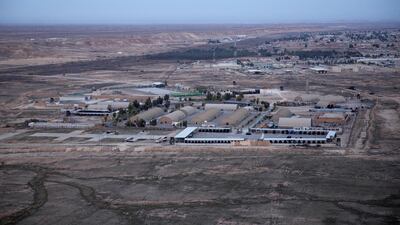Five US personnel were injured on Monday in what is believed to be a rocket attack against Ain Al Asad airbase, which houses American and coalition forces in Iraq, a representative of the US Defence Department told The National.
"Base personnel are conducting a post-attack damage assessment," the official said. "We will provide updates as more information becomes available."
Reuters, which first reported the attack, said two rockets were launched towards the base.
Images on social media appeared to show smoke from the rockets being launched. Early on Tuesday, a previously unheard-of group calling themselves the Revolutionaries claimed responsibility at the attack.
Iraq said on Tuesday it rejects all "reckless" actions that target Iraqi bases, diplomatic missions, and US-led coalition outposts.
A large number of attacks in Iraq in recent years have been claimed by new militia organisations, as opposed to established powerful groups within the Popular Mobilisation Forces, a government-backed but largely Iran-aligned umbrella group of militias.
Experts say many of these new groups are simply front organisations for US-designated terrorist organisations such as Kataib Hezbollah and Asaib Ahl Al Haq, now within the PMF.
They are blamed by the US and UK for hundreds of fatal attacks on their troops, and by rights groups for killing civilians over years of conflict.
After a long pause during negotiations between the government in Baghdad and the US to arrange a departure of American forces from Iraq, the groups have resumed attacks on US troops, who share the vast Aid Al Asad base with Iraqi forces.
The White House said President Joe Biden and Vice President Kamala Harris had been briefed earlier in the day on the national security situation in the region, with a focus on "threats posed by Iran and its proxies to Israel and to US service members in the region".
Mike McCaul, the Republican chairman of the US House foreign affairs committee, said he was "deeply troubled" to learn that US service members had been injured.
"This is just the latest in a long series of attacks from Iran and its proxies," Mr McCaul said in a statement.
"More must be done by this administration to protect our troops in the region."
The attack comes amid heightened regional tension after the killing of Hamas leader Ismail Haniyeh in Tehran, which has been blamed on Israel.
Israel has neither confirmed nor denied the killing, but did claim the assassination of Hezbollah commander Fouad Shukr in Beirut.
The latest attack occurred hours after Mr Biden spoke to Jordan's King Abdullah II by phone.
King Abdullah stressed "the need to de-escalate" and "reach a comprehensive calm" that prevents a wider regional war, Amman said in a statement.
US Secretary of State Antony Blinken has also urged de-escalation, even as Washington has posted warships in the region in preparation for a spillover.
After a months-long pause in Iran-backed attacks against US coalition forces in the region after the start of the Israel-Gaza war, strikes began again in July when forces intercepted another two drones bound for Ain Al Asad.
Charles Lister, a senior fellow at Washington's Middle East Institute, said a response from the US after that one attack in July is unlikely, but that could change "if there are more to come".
Three US soldiers were killed by a drone attack by an Iran-backed Iraqi militia on a US base in north-eastern Jordan in January.
That led to US retaliatory strikes on dozens of targets linked to Iran's Islamic Revolutionary Guard Corps in Iraq and Syria.


